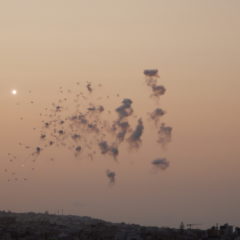
This is a long poem in 14 movements. Every year in southern France, the cicadas start singing at the start of summer, when the temperature reaches around 30 degrees, and lasts throughout the summer until the temperature starts to drop again – from sometime in June until sometime in September. At first it is a gentle sound heralding the warmth of summer but as the heat gets more and more oppressive, the relentless of the chirping of these insects seems to become less friendly. My point of reference was the short story of Gabriel Garcia Marquez, ‘Monologue of Isabel Watching It Rain in Macondo’, in which the initial welcoming of the rain turns to weariness and near madness at its relentlessness. Each movement of the poem is in a different style – free verse, sonnet, film script, Socratic dialogue and each movement relates to each week of the summer. Here are a couple of its sections.
SEMAINE 27
If, as the poet said,
the moon is a ghost sun,
then surely the sea is a ghost sky,
a man is a ghost woman,
the white pebbles on the show are ghost clouds,
a darting swallow the ghost heart of a lover,
the summer-sweet song of the cicada a ghost poem.








